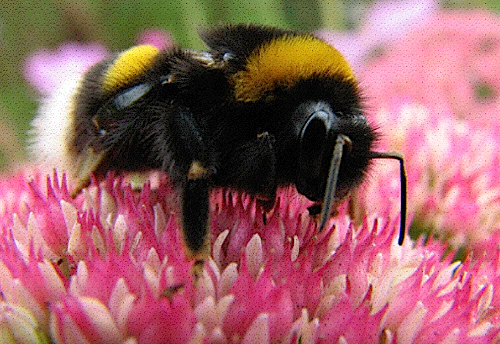
Pollinator campaigners up and down the UK are celebrating after pesticide giant Syngenta shelved its plans to tear down the EU moratorium on neonicotinoids with an application for an “emergency” derogation. The weight of public pressure brought to bear on politicians made it impossible for them to be seen signing off an act of environmental vandalism.
In the space of just over a week between late June and early July, more than 6,000 supporters of Friends of the Earth joined a campaign to write to the UK bees minister, Lord de Mauley, while prime minister David Cameron received a massive 202,926 signatures on a petition delivered by online campaign website 38 Degrees. Cameron also received a letter from the Bee Coalition, which includes environmental NGOs such as the Pesticide Action Network UK, Friends of the Earth UK, Buglife and the Soil Association. “These chemicals have been banned because there is clear scientific evidence linking them to damaging the health of bees. Ministers should be helping to get farmers off the chemical treadmill so they can protect their crops without relying on bee-harming chemicals,” declared FOE campaigner Paul de Zylva.
Nick Mole, policy officer of the Pesticides Action Network UK sees the EU moratorium as an opportunity: “The two year ban on the use of neonicotinoids should be an opportunity for innovation to look at new ways of controlling pests without them.” There are established alternatives, as the Soil Association’s Emma Hockridge explained: “There are a range of methods which farmers can use which do not require the use of neonicotinoid pesticides. Organic farmers use a system of production which has strong benefits for pollinator populations – a recent meta-analysis from Oxford University showed on average, organic farms have 48% more species of pollinators than non-organic farms.”
Officially, Syngenta gave up on its derogation attempt after “…an assessment of the current planting schedule for growers.” But, caught in the glare of public attention, the corporate colossus could hardly continue without damaging its credibility.
The National Farmers’ Union showed no hesitation in expressing its dismay, expressing its: “…concern that the whole issue has been heavily politicised and manipulated with misinformation by campaign groups with their own agenda against pesticide use, without concern for the consequences for this country’s productive capacity or indeed for the potential unintended consequences for bee populations.” NFU vice president Guy Smith remains committed to further attempts to overturn the two-year moratorium: “The NFU will closely monitor the effects with a view to supporting a further application next year,” he fumed.
However, there is evidence that neonicotinoids are damaging to a wider range of invertebrates than previously supposed. Last month the International Union for Conservation of Nature announced the imminent publication of a Worldwide Integrated Assessment (WIA) in the peer-reviewed journal Environment Science and Pollution Research. As well as harming bees, neonicotinoids have been linked to changes in earthworm tunnelling behaviour and harm to bird and butterfly populations.
“The evidence is very clear. We are witnessing a threat to the productivity of our natural and farmed environment equivalent to that posed by organophosphates or DDT,” warns one of the lead authors, Dr Jean-Marc Bonmatin of The National Centre for Scientific Research in France. “Far from protecting food production, the use of neonics is threatening the very infrastructure which enables it, imperilling the pollinators, habitat engineers and natural pest controllers at the heart of a functioning ecosystem.”
Since only two percent of the active ingredient in seed dressings are taken up by the plant, all the remaining pesticide used in seed dressings are effectively dumped in the environment and polluting soil or soil water. Although Syngenta would not offer an indication of the list price of its neonicotinoid products, there can be no doubt that chemicals like these are costing the earth.
More: See our comprehensive dedicated sections on bees and on pesticides.
More from Peter Crosskey:
- Bumblebees dying for a change in US pesticide laws
- NGOs’ dismay with CAP greening in Britain & Ireland
- UK ministry denies bullying food bank charity
- UK adopts just five EFA categories for CAP greening
- No offline plan B for UK CAP payments in 2015
- TTIP: setting course for food production carve-ups?
- Londoners learn about TTIP environmental agenda
- European Milk Board calls for immediate end to TTIP
- How a ‘Yes’ vote would help Scottish agriculture
- DEFRA spells out online CAP requirements





